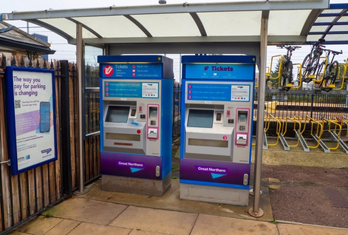Ministers have announced a ‘significant intervention’ to cap this year’s increase in regulated rail fares at 4.9%, rather than the 9% RPI inflation figure for last July on which rises have previously been based.
With fares set to rise on 3 March, ministers also said passengers will benefit from ‘cheaper fares’ for longer on regulated tickets. These include standard day returns, season tickets and most commuter fares, making up almost half of rail fares.
When making the announcement late last month, the Department for Transport (DfT) pointed to the latest statistics showing inflation is currently at 3.9%, meaning that the rise is above inflation.

Automatic ticket machines at St Neots train station
Transport secretary Mark Harper said: ‘Changed working patterns after the pandemic means that our railways are still losing money and require significant subsidies, so this rise strikes a balance to keep our railways running, while not overburdening passengers.’
Michael Solomon Williams from Campaign for Better Transport said: ‘We are being asked to be thankful for small mercies, but raising rail fares next year when fuel duty remains frozen sends the wrong message about how we want and need people to travel. To tackle air pollution, congestion and climate change, rail travel needs to be an affordable choice, not a luxury.'
The charity added that the announcement will see season tickets on five popular commuter routes into London newly go above £5,000, with three passing the £6,000 mark.
A spokesperson for London TravelWatch said: ‘Reform to rail fares and ticketing could not be more urgent now. Government needs to set out an alternative vision that makes public transport appealing - this includes affordable fares, rolling out contactless payment options, and improving train service punctuality so passengers are getting real value-for-money.’
The watchdog added that Transport for London could match the increase as part of its recent funding agreement with the Government.
The DfT pointed out that the rise in the fare cap for National Rail operators in England is significantly lower than in Scotland, where rail fares are set to increase by 8.7% from April.